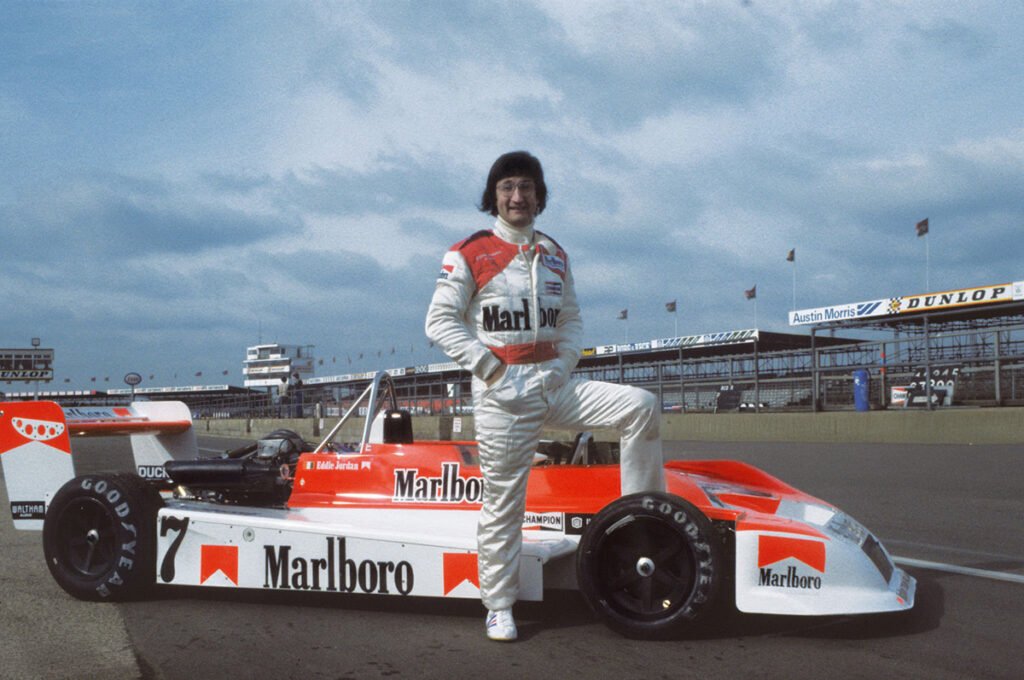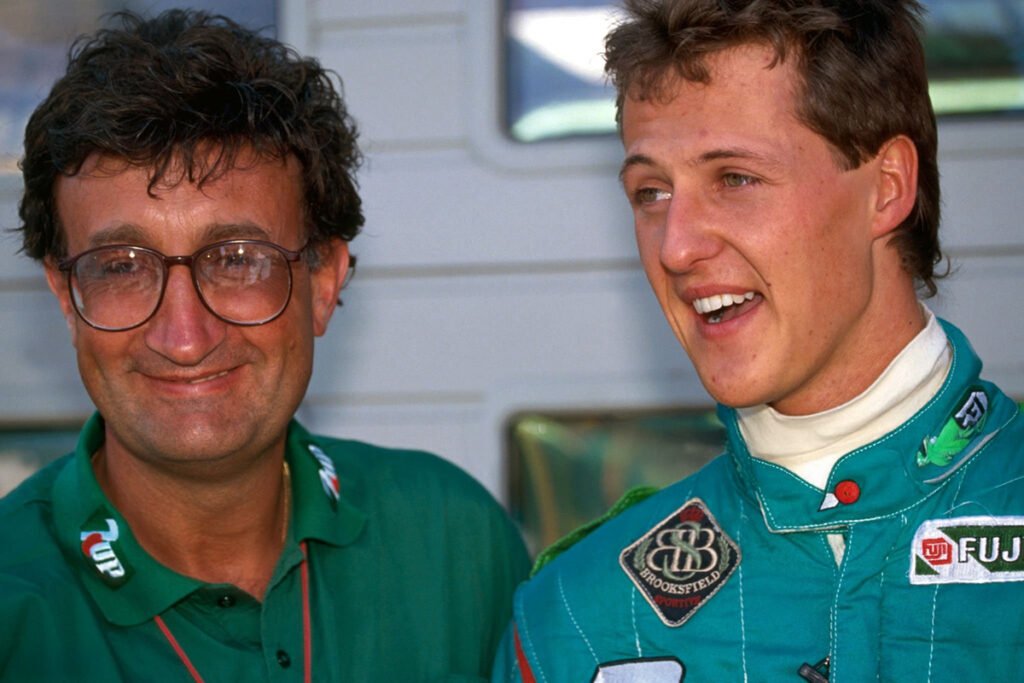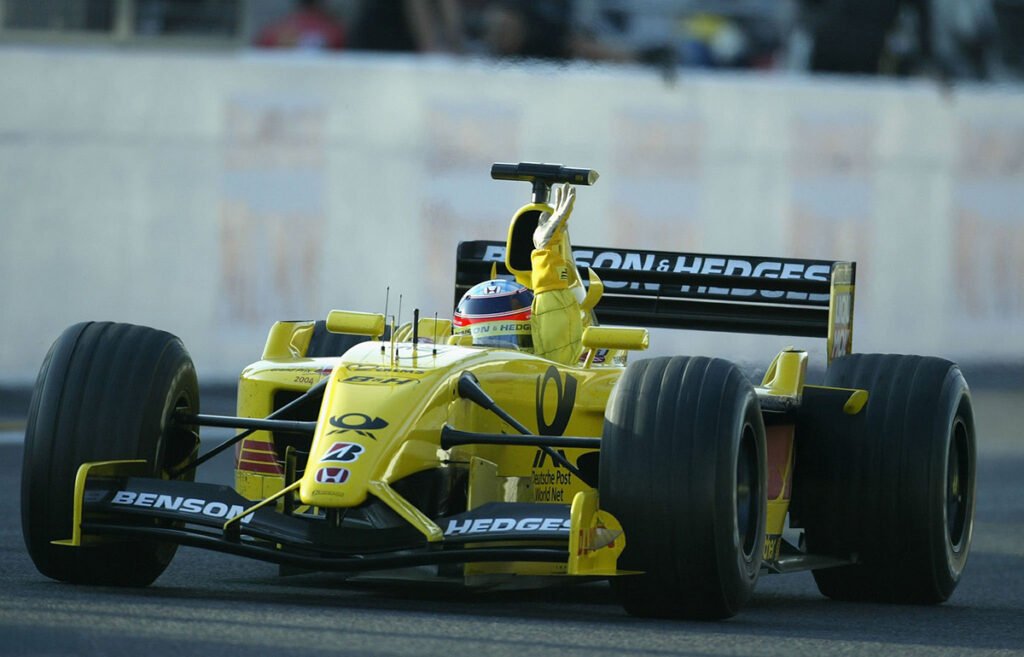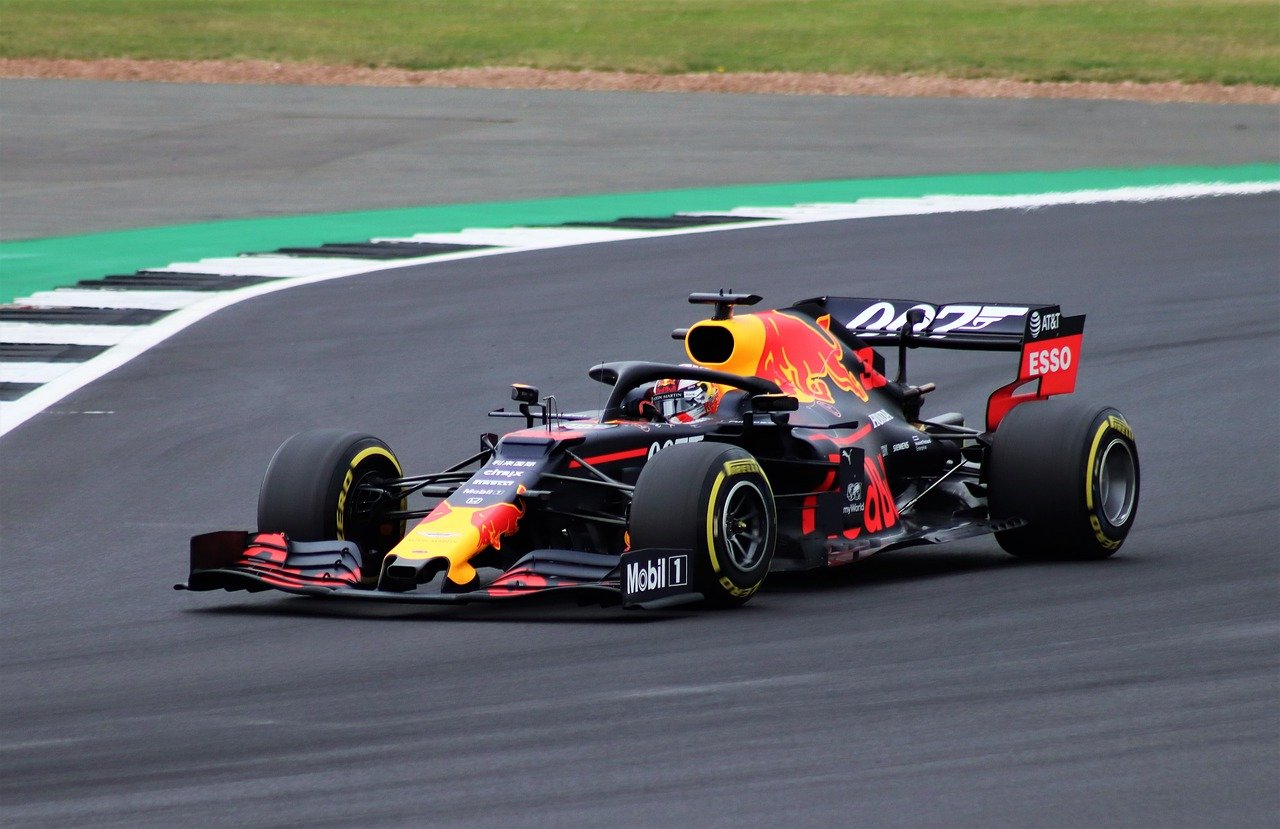The world of motorsport has sadly lost Eddie Jordan OBE at the age of 76. This charismatic Irishman, renowned for his infectious energy, sharp wit, and remarkable ability to spot talent, passed away after a battle with an aggressive form of cancer, which he had announced publicly in December 2024. Jordan, a former Formula 1 team owner, television pundit, and entrepreneur, leaves behind a legacy that will continue to inspire for years to come.
Born Edmund Patrick Jordan in Dublin on 30 March 1948, EJ showed his entrepreneurial flair early on, even selling fruit to classmates for a profit. After working at the Bank of Ireland, a summer job in Jersey in 1970 ignited his lifelong passion for kart racing. He quickly excelled, becoming the Irish Kart Champion in 1971.
Jordan’s ambitions then shifted to cars, where he competed in Formula Ford and Formula Three. Despite a serious crash in 1976, he returned to racing in Formula Atlantic and won the Irish Formula Atlantic Championship in 1978. Although he raced against future world champions and tested a McLaren F1 car, the financial realities and the arrival of his second child led him to the crucial decision to focus on team management rather than his own driving career.

In 1980, at 32, Eddie Jordan Racing was founded, operating from a lock-up at Silverstone. Through sheer determination and hustle, Jordan built a team that nurtured talented drivers such as Martin Brundle and Johnny Herbert, with Herbert securing their first title in the British Formula Three Championship in 1987. This success continued into Formula 3000, where Jean Alesi won the championship in 1989.
However, EJ’s ultimate goal was Formula 1. In 1991, Jordan Grand Prix entered the sport, becoming the first Irish team to do so. Despite initial financial challenges, the team quickly earned respect and often outperformed expectations. In their debut season, Jordan famously gave Michael Schumacher his Formula 1 debut at the Belgian Grand Prix. Although Schumacher was quickly poached by Benetton, this event put Jordan on the map.

Undeterred, Jordan continued to develop his team, which became known for its distinctive yellow livery from 1996 and its vibrant, “rock and roll” image. He had a knack for identifying young talent, giving opportunities to drivers like Damon Hill, Rubens Barrichello, Jean Alesi, and Eddie Irvine. The team achieved its first Formula 1 victory in 1998 at the dramatic Belgian Grand Prix with Damon Hill driving, followed by an impressive one-two finish with Ralf Schumacher. 1999 marked a peak for Jordan, with Heinz-Harald Frentzen becoming a serious contender for the championship, ultimately finishing third and securing two race wins. Jordan also finished third in the constructors’ championship that year, a testament to EJ’s unwavering drive.

Despite this success, the financial pressures of Formula 1 began to mount. Sponsorship deals fluctuated, and engine partnerships changed. The final victory for the Jordan team came in the chaotic 2003 Brazilian Grand Prix with Giancarlo Fisichella. In early 2005, Jordan made the decision to sell his team to the Midland Group. The team subsequently went through several transformations, eventually becoming Aston Martin in 2021, still operating from Jordan’s original premises at Silverstone.
After stepping away from team ownership, Jordan embarked on a successful career in the media, becoming a popular and outspoken pundit for BBC Sport from 2009 to 2015 and then for Channel 4 from 2016. His deep knowledge of the sport and his candid opinions made him a compelling voice, and he was even known for breaking significant news stories. In 2023, he launched his own podcast, Formula For Success, with David Coulthard, and his final appearance was released on the day of his passing.
Beyond Formula 1, Jordan had a wide range of interests. He was a passionate fan of rock and roll music and played the drums in his band, initially called V10 and later Eddie and the Robbers. He was also a keen supporter of football clubs like Celtic, Coventry City, and Chelsea, and held shares in Celtic. His entrepreneurial spirit extended to various business sectors, including oil, sports, property, gaming, and entertainment. He also co-owned London Irish rugby club. In a final initiative to secure his legacy, a consortium led by Jordan successfully completed the takeover of London Irish in February 2025, with the aim of returning them to top-tier rugby.
Jordan was also deeply committed to charitable causes, serving as a patron of CLIC Sargent (now Young Lives vs Cancer) and the Amber Foundation. He received an honorary OBE in 2012 for his contributions to charity and motorsport. He also received honorary doctorates and awards in recognition of his impact on motorsport in Ireland.
Married to Marie since 1979, Eddie was a devoted husband and father to their four children: Zach, Mickey, Zoe, and Kyle. They had homes in Cape Town, London, and Monaco.
The tributes following Eddie Jordan’s passing have highlighted the profound impact he had on the sport and the many lives he touched. Figures such as Martin Brundle and Damon Hill, both of whom drove for Jordan, spoke of his entrepreneurial spirit, his racer mentality, and the opportunities he provided to so many. Stefano Domenicali, Formula 1’s chief executive, acknowledged him as “a protagonist of an era of F1” who will be greatly missed. His family’s statement beautifully captured his essence: “EJ brought an abundance of charisma, energy and Irish charm everywhere he went. We all have a huge hole missing without his presence”.

Eddie Jordan was far more than just a team owner or a pundit; he was a force of nature, a dealmaker, an entertainer, and a true underdog who dared to dream big and, against the odds, achieved remarkable success. His vibrant personality and lasting contributions have left an indelible mark on Formula 1, and he will be remembered with immense fondness. The sport is undoubtedly poorer without him, but the “tonnes of great memories” he leaves behind will continue to bring smiles through the sorrow.
Frequently Asked Questions: Eddie Jordan’s Life and Career
What were Eddie Jordan’s early career ventures before Formula 1?
Before establishing his Formula 1 team, Eddie Jordan pursued a career as a racing driver in various categories, achieving success in Irish Karting (winning the championship in 1971), Formula Ford, and Formula Atlantic (winning the Irish championship in 1978). Simultaneously, demonstrating his entrepreneurial spirit, he engaged in various ventures, including selling carpet offcuts to fund his racing. In 1980, he transitioned into team management by founding Eddie Jordan Racing, which competed in junior formulas like British Formula Three and Formula 3000, nurturing the talents of future stars.
When did Jordan Grand Prix enter Formula 1 and what were some of its key moments?
Jordan Grand Prix made its Formula 1 debut in the 1991 season. A significant early moment was giving Michael Schumacher his debut race at the Belgian Grand Prix. The team achieved its first race victory in 1998 at the Belgian Grand Prix with Damon Hill, who finished ahead of teammate Ralf Schumacher in a one-two finish. The 1999 season saw Jordan reach its peak, with Heinz-Harald Frentzen contending for the drivers’ championship and ultimately finishing third, alongside two race wins for the team, leading to a third-place finish in the constructors’ championship.
Which notable drivers raced for Eddie Jordan and how did he impact their careers?
Eddie Jordan had a reputation for spotting and nurturing young talent, giving numerous drivers their break in motorsport. World champions Michael Schumacher and Damon Hill both drove for his team, with Schumacher making his F1 debut with Jordan. Other notable drivers who raced for Jordan include Jean Alesi, Rubens Barrichello, Thierry Boutsen, Giancarlo Fisichella, Heinz-Harald Frentzen, Johnny Herbert, Eddie Irvine, Roberto Moreno, Ralf Schumacher, Jarno Trulli, Martin Brundle, and John Watson. Many of these drivers credited Jordan with providing crucial opportunities in their junior careers and their progression to Formula 1.
What was the financial situation like for Jordan Grand Prix and why was the team eventually sold?
Jordan Grand Prix often operated with limited financial resources, especially in its early years, relying on Eddie Jordan’s deal-making abilities to secure sponsorship. While the team achieved periods of success, financial pressures, including the loss of engine deals and major sponsorships, began to take their toll in the early 2000s. Despite a memorable final win in Brazil in 2003, the increasing costs of running an F1 team ultimately led to Eddie Jordan selling the outfit to the Midland Group in early 2005.
What happened to the Jordan F1 team after Eddie Jordan sold it?
Following its sale to the Midland Group in 2005, the team underwent several ownership changes and name alterations. It became MF1 Racing, then Spyker F1, and subsequently Force India. After financial difficulties, Force India was liquidated and its assets were used to create Racing Point, which was eventually rebranded as Aston Martin for the 2021 Formula 1 season. Notably, the Aston Martin team continues to operate from Jordan’s original premises at Silverstone.
What was Eddie Jordan’s career in the media after selling his F1 team?
After selling Jordan Grand Prix, Eddie Jordan transitioned into a successful media career. He became a prominent television pundit and analyst for Formula 1 coverage, first with BBC Sport from 2009 to 2015, and later with Channel 4 from 2016. Known for his candid opinions and well-established connections within the sport, he also co-presented the “Formula For Success” podcast. Jordan also briefly joined the presenting team of Top Gear.
Beyond Formula 1 and media, what were Eddie Jordan’s other interests and ventures?
Eddie Jordan had a wide range of interests and business ventures beyond Formula 1. He was a keen musician, playing the drums in a band. His business interests spanned various sectors, including oil, sports, property, gaming, and entertainment. He was a shareholder in Celtic Football Club and had involvement with London Irish Rugby Club, including leading a consortium to purchase them. Jordan was also involved in charity work, notably as a patron of CLIC Sargent (now Young Lives vs Cancer) and the Amber Foundation, for which he received an honorary OBE. He was also a boating enthusiast and a supporter of Irish art.
How is Eddie Jordan remembered in the Formula 1 community and what is his lasting legacy?
Eddie Jordan is fondly remembered as one of Formula 1’s most colourful and charismatic figures. He was known for his entrepreneurial spirit, his ability to build a successful team from scratch, and his knack for spotting and nurturing talent. His “rock and roll” approach brought a unique and exciting element to the sport. He is remembered for the Jordan team’s vibrant yellow livery, its underdog successes, and the many drivers who were given their opportunity by him. His legacy extends beyond his team’s achievements to his significant contributions to motorsport broadcasting and his philanthropic work. He is widely regarded as a true original who left a lasting positive impact on Formula 1.
Timeline of Main Events Involving Eddie Jordan
- 30 March 1948: Edmund Patrick Jordan (“Eddie Jordan” or “EJ”) is born in Dublin, Ireland.
- Early Years: Grows up in Dublin and Bray, briefly considers the priesthood, and eventually works as a bank clerk for the Bank of Ireland. Known by the nickname “Flash”.
- 1970 (Summer): While working in Jersey during a banking strike, Jordan encounters kart racing for the first time and has his first unofficial races.
- 1971: Returns to Dublin, buys a kart, and wins the Irish Kart Championship.
- 1974: Moves up to Formula Ford and competes in the Irish Formula Ford Championship.
- 1975: Progresses to Formula Three.
- 1976: Forced to sit out the season after a crash at Mallory Park results in a shattered left leg.
- 1978: Switches to Formula Atlantic and wins the Irish Formula Atlantic Championship and the BP-backed All-Ireland championship.
- 1979: Races in British Formula Three with Stefan Johansson under the “Team Ireland” banner, participates in one Formula Two race, and does some testing for McLaren. Marries Marie McCarthy.
- Late 1979: Short of money, founds his first team, Eddie Jordan Racing.
- 1981: Drives in the 24 Hours of Le Mans in a BMW M1 with Steve O’Rourke and David Hobbs.
- 1983: Martin Brundle races for Eddie Jordan Racing in British Formula 3, finishing second to Ayrton Senna in a close championship battle.
- 1987: Johnny Herbert wins the British Formula Three Championship for Eddie Jordan Racing.
- Late 1980s: Jordan begins managing the careers of drivers, including Martin Brundle, Johnny Herbert, and Eddie Irvine. This venture earns him significant funds.
- 1988: Eddie Jordan Racing’s Formula 3000 team achieves its first wins with Johnny Herbert and Martin Donnelly.
- 1989: Jordan’s F3000 team dominates the season, with Jean Alesi winning the championship. Gary Anderson joins the team as chief designer.
- 4 February 1990: Gary Anderson joins Eddie Jordan Racing full-time.
- Early 1991: Jordan founds Jordan Grand Prix, entering Formula One with Gary Anderson as Chief Designer. The Jordan 911 car is launched (later renamed the 191).
- March 1991 (US Grand Prix): Jordan Grand Prix makes its Formula One debut with Bertrand Gachot and Andrea de Cesaris driving.
- August 1991 (Belgian Grand Prix): Jordan gives Michael Schumacher his Formula One debut after Bertrand Gachot is jailed. Schumacher qualifies impressively but is then signed by Benetton for the next race.
- 1994: Rubens Barrichello, driving for Jordan, achieves the team’s first podium finish at the Pacific Grand Prix and its first pole position at the Belgian Grand Prix.
- 1995: Jean Alesi (a former Jordan driver) wins the Canadian Grand Prix for Ferrari, with former Jordan drivers Barrichello and Irvine also on the podium.
- 1996: Jordan introduces its iconic yellow livery after securing a major sponsorship deal with Benson & Hedges.
- 1998 (Belgian Grand Prix): Damon Hill achieves Jordan’s first Formula One victory, with teammate Ralf Schumacher finishing second in a one-two for the team.
- 1999: Heinz-Harald Frentzen, driving for Jordan, wins two races (French and Italian Grands Prix) and becomes a contender for the drivers’ championship, ultimately finishing third. Jordan finishes third in the constructors’ championship, the team’s best ever result.
- 2002: Jordan loses its Honda engine partnership deal to BAR and switches to more expensive Cosworth engines.
- 2003 (Brazilian Grand Prix): Giancarlo Fisichella achieves Jordan’s final Formula One victory in the team’s 200th race.
- 2004: Jordan retains complete ownership despite financial difficulties and rumoured buyout approaches.
- Early 2005: Midland Group, financed by Alex Shnaider, buys Jordan Grand Prix. Eddie Jordan sells his remaining stake, marking his departure from team ownership in Formula One.
- 2005 Onwards: The Jordan team is subsequently renamed MF1 Racing (2006), Spyker F1 (2007), Force India (2008-2018), Racing Point (2019-2020), and ultimately becomes Aston Martin (2021), operating out of Jordan’s old premises at Silverstone.
- 2007: Publishes his autobiography, “An Independent Man”. Appointed Chairman of Rally Ireland.
- 2009: Returns to the Formula One scene as a pundit for BBC Sport’s Grand Prix programme.
- 2012: Receives an honorary OBE for services to charity and motor racing.
- 2016: Joins Channel 4 as their lead Formula One analyst. Also announced as one of the new presenters for Top Gear.
- 2015: Circumnavigates the world by yacht.
- September 2021: Receives the Freedom of the City of London.
- July 2021 – January 2022: Involved in a potential bid to acquire gaming company Playtech through his company JKO Capital, but the bid does not proceed.
- October 2024: Reported to be part of a consortium looking to purchase the financially troubled London Irish Rugby Club.
- December 2024: Publicly announces his diagnosis of an aggressive form of prostate and bladder cancer earlier in the year.
- February 2025: A consortium led by Eddie Jordan completes the takeover of London Irish Rugby Club.
- 20 March 2025: Eddie Jordan passes away peacefully at the age of 76 in Cape Town, South Africa, with his family by his side. His final podcast appearance is released on the day of his passing.
Cast of Characters
- Eddie Jordan (Edmund Patrick Jordan): The central figure. Born in Dublin in 1948. Started as a bank clerk, became a successful kart and junior single-seater racer. Founded and owned the Jordan Grand Prix Formula One team (1991-2005). Later became a well-known and candid television pundit for the BBC and Channel 4. A charismatic entrepreneur with a “rock and roll” approach to motorsport, known for giving many drivers their start in Formula One. Also had diverse business interests and was involved in charity work and the London Irish Rugby Club. Died on 20 March 2025 after battling cancer.
- Marie Jordan (née McCarthy): Eddie Jordan’s wife, an Irish former basketball player. They married in 1979 and had four children: Zach, Mickey, Zoe, and Kyle.
- Martin Brundle: British former racing driver who raced for Eddie Jordan in Formula 3 (1983) and Formula One (for the Jordan team). Finished second to Ayrton Senna in the 1983 British F3 Championship for Jordan. Later became a Formula One commentator and pundit, working with Eddie Jordan.
- Adrien Newey: Highly successful Formula One car designer. Eddie Jordan was his manager at one point. Newey moved to Aston Martin in 2025, a team that evolved from Jordan Grand Prix.
- Craig Slater: Motorsport reporter who provided updates on Eddie Jordan’s passing.
- Jose Mourinho: Mentioned as one of the people Eddie Jordan associated with, highlighting Jordan’s wide network and deal-making abilities.
- Damon Hill: British former Formula One world champion. Drove for Jordan and secured the team’s first Formula One victory at the 1998 Belgian Grand Prix.
- Michael Schumacher: German former Formula One world champion. Made his Formula One debut with the Jordan team at the 1991 Belgian Grand Prix before being poached by Benetton for the following race.
- Heinz-Harald Frentzen: German former Formula One driver. Achieved two race wins for Jordan in 1999 and briefly contended for the drivers’ championship.
- Jarno Trulli: Italian former Formula One driver who raced for Jordan.
- Giancarlo Fisichella: Italian former Formula One driver who secured Jordan’s last Formula One victory at the 2003 Brazilian Grand Prix.
- Andy Cowell: Team Principal of the Aston Martin F1 Team. Paid tribute to Eddie Jordan’s legacy as the founder of the team.
- Frank Williams, Ken Tyrrell, Ron Dennis: Legendary Formula One team owners of a similar era to Eddie Jordan, who built their teams from scratch.
- Eddie Irvine: Irish former Formula One driver who was managed by Eddie Jordan and later drove for Jordan.
- Jean Alesi: French former Formula One driver who won the Formula 3000 championship for Eddie Jordan Racing in 1989 and was also managed by Jordan.
- Ralf Schumacher: German former Formula One driver who drove for Jordan and finished second to Damon Hill in the team’s first victory.
- Pedro de la Rosa: Spanish former Formula One driver who drove for Jordan.
- Bernd Schneider: German racing driver who tested the Jordan car.
- Bertrand Gachot: Belgian former Formula One driver who was one of Jordan Grand Prix’s first drivers in 1991 but was later jailed.
- David Leslie and David Sears: Drivers for Eddie Jordan Racing in its early years (1981).
- James Weaver: Primary driver for Eddie Jordan Racing in 1982 and again in European F3 in 1983.
- Ayrton Senna: Legendary Brazilian Formula One world champion who Martin Brundle finished second to in the 1983 British F3 Championship while driving for Jordan.
- Martin Donnelly: Irish former racing driver who secured early wins for Jordan’s Formula 3000 team in 1988.
- Gary Anderson: Chief Designer for Jordan Grand Prix from its inception in 1991. Instrumental in creating the Jordan 191 car.
- Alex Shnaider: Wealthy Canadian businessman who financed the Midland Group that bought Jordan Grand Prix in early 2005.
- Jake Humphrey and Suzi Perry: Presenters of BBC Sport’s Grand Prix programme for whom Eddie Jordan worked as a pundit.
- David Coulthard: Former Formula One driver and pundit who worked alongside Eddie Jordan on the BBC and Channel 4, and co-hosted the “Formula For Success” podcast with him.
- Bernie Ecclestone: Long-time influential figure in Formula One, with whom Eddie Jordan had a long friendship.
- Steve O’Rourke: Pink Floyd’s manager, with whom Eddie Jordan raced at Le Mans in 1981.
- Mouse Morris: Horse trainer with whom Eddie Jordan had horses in training.
- Richard Hadidas: Friend of Eddie Jordan who successfully bid for Oyster Yachts in 2018, with Jordan serving as a director and later brand ambassador.
- Dermot Desmond and Denis O’Brien: Irish businessmen who were early supporters of Jordan F1 and with whom Eddie Jordan had subsequent business investments.
- Keith O’Loughlin: Partner with Eddie Jordan in the JKO bid to acquire Playtech.
- Bobby Skinstad and Andrew Mehrtens: Former rugby players who were part of Eddie Jordan’s consortium to purchase London Irish Rugby Club.
- Derek McMahon: Irish racing legend who supported Eddie Jordan’s 1979 British F3 campaign.
- Nigel Mansell, Mike Thackwell, Andrea de Cesaris, Chico Serra, Alan Prost: Fellow drivers who competed against Eddie Jordan in his racing career.
- Tommy Byrne and David Kennedy: Other Irish drivers supported by Derek McMahon.
- Andrew Gilbert-Scott: Finished second in British F3000 for Jordan in 1989 and later became Takuma Sato’s manager.
- John Watson: Ulsterman and former F1 driver who tested the first Jordan F1 car, the 911 (later 191).
- Bernard Ferguson: Representative of Cosworth who facilitated a deal for engines for the Jordan team.
- Duncan Lee: Camel sponsorship director who was eventually persuaded to sponsor Eddie Jordan’s F3000 team.
- Peter Collins: Benetton team manager who initially offered Johnny Herbert an F1 race seat, which was later vetoed.
- Michele Alboreto and Jonathan Palmer: Tyrrell drivers during the period when Eddie Jordan was trying to place Jean Alesi in F1.
- Mike Earle: Fellow F3000 team boss whose struggles with the Onyx F1 team served as a cautionary tale for Jordan.
- Andrew Green and Mark Smith: Engineers who worked with Gary Anderson to design the first Jordan F1 car.
- Stefano Domenicali: Formula 1 chief executive who paid tribute to Eddie Jordan.
- Karun Chandhok and David Croft: Sky Sports F1 pundits who shared tributes to Eddie Jordan.
- Jake Humphrey: Former BBC Sport presenter who shared a personal anecdote about Eddie Jordan.

